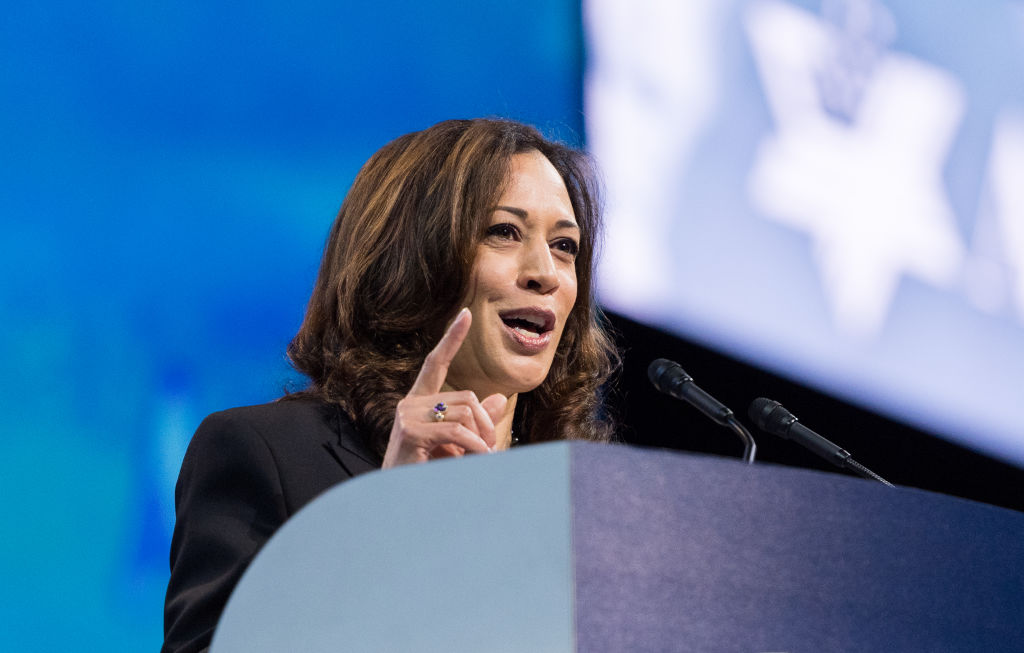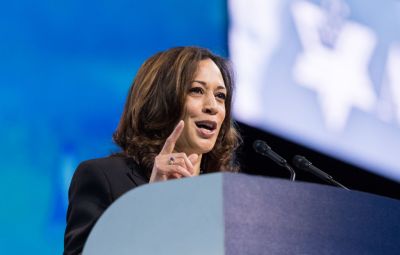Jewish Democrats who prioritize strong American support for Israel are casting a wary eye on Kamala Harris amid her promotion from running mate to the party’s presumptive 2024 nominee, worried the vice president is not as staunch an ally of the Jewish state as her boss, President Joe Biden.
Even after months of Biden pushing Prime Minister Benjamin Netanhayu for a ceasefire in Gaza and temporarily halting some U.S. weapons shipments to Israel, Jewish Democrats trust the 81-year-old president to have Jerusalem’'s back, based on a 50-year political career of near-unwavering support. Harris, 59, doesn’t share that history. And, in the aftermath of the deadly October 7 invasion of Israel by the terrorist group Hamas, many Jewish Democrats lack confidence in the vice president to be as steadfast as Biden.
Fueling their concerns about Harris as she embarks on a campaign against the Republican nominee, former President Donald Trump, is a Democratic voting base that has grown distant, even hostile, toward Israel. For instance, a collection of seven labor unions aligned with the Democratic Party this week sent Biden a letter demanding his administration cease all military aid to Israel.
To these Jewish Democrats, Biden can be relied upon to resist calls by the party’s liberal base to abandon American support for the Jewish State, even if he occasionally takes steps to assuage left-wing activists who want the U.S. to prioritize Palestinian statehood over Jerusalem’s security. While Harris is certainly not viewed as blatantly anti-Israel, she is deemed sympathetic to progressive Democrats who go so far as to oppose Israel’s right to exist—and therefore an unreliable ally.
“The acid test, if she was asked the same question as Biden was: ‘Are you a Zionist?’ Uncoached, what would she say?” a veteran political activist in the Midwest who focuses on the U.S.-Israel relationship told The Dispatch. “Would she take that on? Would she say: ‘Yes?’” This source requested anonymity in order to speak candidly about the presumptive Democratic nominee, who took over for Biden atop the ticket just this week.
Since October 7, the president has emphasized that he considers himself a Zionist, meaning he supports Israel’s right to exist as a majority Jewish state. “You don’t have to be a Jew to be a Zionist, and a Zionist is about whether or not Israel is a safe haven for Jews because of their history of how they’ve been persecuted,” Biden said, again, in an interview this month. “If there weren’t an Israel, every Jew in the world would be at risk.”
That Harris needs to reassure Jewish Democrats who value strong U.S. support for Israel is a product of her comments regarding the war in Gaza since Hamas’s surprise October 7 invasion in which terrorists crossed into Southern Israel from Gaza and killed roughly 1,200, mostly civilians, including women and children. Roughly 250 more Israelis were taken hostage by Hamas, many of whom have since died in captivity, or remain imprisoned.
Harris has been noticeably critical of the war launched by Israel’s Netanyahu-led coalition government aimed at eliminating Hamas’ leadership and dismantling the terrorist group’s war-making capabilities that has resulted in thousands of civilian Palestinian casualties. The vice president called for a ceasefire well before Biden; is expected to be quicker to chastise Netanyahu; and has expressed sympathy for anti-Israel protests on college campuses, although she has rejected the flagrant antisemitism prevalent at these gatherings.
Punctuating Harris’ reputation for softer Israel support: The vice president skipped Netanyahu’s speech Wednesday to a joint session of Congress, as did dozens of Democrats who cited their opposition to the prime minister, the war in Gaza, or both. Harris was absent even though in her role as Senate president she presides over joint sessions (along with the House speaker) and had never abdicated the task previously. Harris claimed a scheduling conflict and pointed to her one-on-one meeting with Netanyahu scheduled for Thursday as evidence of her commitment to the U.S.-Israel relationship.
“Until now, she has been the Biden administration’s ambassador to the progressives, trying to mute Biden’s strong support for Israel. If she’s going to have the strong support of Jewish voters and donors, she needs to change course,” said a concerned Jewish Democrat and longtime campaign contributor, who requested anonymity to speak candidly about the party’s presumptive nominee. “And it wouldn’t hurt if she was more forceful on the issue of a nuclear Iran.”
The Harris campaign declined to comment, as did the vice president’s office. But the Jewish Democratic Council for America defended Harris’ Israel bona fides, saying the vice president has stood with the Jewish state throughout her Biden administration tenure and before that, four years as a U.S. senator from California. Halie Soifer, the group’s CEO, said Harris has been in regular contact with Netanyahu and members of his war cabinet, and that she unequivocally backs Israel’s right to defend itself.
“Vice President Harris has consistently expressed and demonstrated her support for Israel, both before and after the horrific Hamas attack on October 7,” said Soifer, a national security adviser to Harris in 2017 and 2018, when she served in the Senate. “The vice president has provided support to the families of hostages and victims of Hamas terror, including her remarks from the White House last month excoriating Hamas’ horrific sexual violence and use of rape as a weapon of war.”
Harris, a former San Francisco district attorney who was later elected California attorney general, descends from America's bipartisan support for Israel, a historical trend so unremarkable that it was for long an afterthought on her résumé.
In 2017, speaking to the annual conference of the American Israel Public Affairs Committee, then-Sen. Harris, whose mother was from India and father was from Jamaica, told the story of her 2014 interfaith marriage to attorney Douglas Emhoff, who is Jewish. She recalled with joy the shouts of “Mazel Tov!” after the groom engaged in the ritual of breaking the glass—stomping on a wine glass.
During that well-received address, Harris advocated for a negotiated rather than imposed two-state solution that includes a Palestinian homeland. But the balance of her speech was dedicated to opposing domestic antisemitism and supporting Israel’s legitimacy and security abroad, detailing her plans to further that effort in the Senate. “That is why the first resolution I co-sponsored as a United States senator was to combat anti-Israel bias at the United Nations,” she said.
Seven years on, Democratic insiders don’t expect any perceptions that Harris has moderated her backing for Israel to spark major defections from the party’s presidential ticket, saying Jewish voters, historically supportive of Democrats up and down the ballot, are likely to conclude Trump is an unacceptable alternative. This is despite his record of strong support for Israel during his term in the White House that saw him move the U.S. embassy from Tel Aviv to Jerusalem, recognize Israeli sovereignty over the Golan Heights, and negotiate historic peace agreements with Arab nations known as the Abraham Accords.
Indeed, exit polling from 2020 shows that, despite Trump’s achievements, Jewish voters—motivated largely by domestic concerns—sided with Biden over Trump by a margin of 68 percent to 30 percent.
But Republicans are optimistic they can make inroads with Jewish voters based on political and societal conditions that are wholly different than they were four years ago. In the days immediately following October 7, incidents of antisemitism spiked by 388 percent and 73 percent of Jewish students either experienced or witnessed antisemitic acts, according to the Anti-Defamation League. Meanwhile, a survey of U.S. Jews commissioned by the American Jewish Committee found that 42 percent feel unsafe wearing religious symbols in public.
The Republican Jewish Coalition believes these and other factors are conspiring to significantly increase Trump’s support among Jewish voters on November 5—including those who consider themselves Democrats and usually support Democratic candidates.* That was the group’s expectation before Sunday, when Biden dropped his reelection bid. It is especially their expectation now, with Harris. It’s why the Republican Jewish Coalition on Wednesday began airing a modestly funded television advertisement in Pennsylvania, a key swing state, using Israel as the basis for attacking the vice president.
“As Israel fights an existential war for its very survival, and as hostages languish in Gaza at the hands of Hamas terrorists—including 8 Americans—Kamala Harris is choosing to snub Prime Minister Benjamin Netanyahu's critical address to Congress,” the group’s CEO, Matt Brooks, said in a statement. “Instead, she is going to a sorority luncheon. Yes, you read that right. What a shanda.” (Shanda, a Yiddish word, translates to “shame,” or “disgrace.”)
Democratic strategists who focus on the Jewish vote dismissed Republican attacks over Harris’ Wednesday schedule and decision not to preside over Netanyahu’s speech to Congress. They say that the vice president’s record on Israel is exemplary and should give Jewish Democrats who prioritize U.S. support for Jerusalem no qualms about how she would function in the top job.
Still, they acknowledge that Harris has some work to do, given that her foreign policy résumé generally and her record on Israel in particular is not as lengthy as Biden’s. The president was elected to the Senate in 1972, would go on to serve as chairman of the Foreign Relations Committee, and later as a two-term vice president. Biden’s been actively supporting Israel for so long, he is fond of recounting a meeting he once had with legendary Israeli Prime Minister Golda Meir, who left office in 1974 and died four years later.
That the Democratic Party broadly and its allied groups are not dependable Israel boosters, as they once were, is another reason why Harris can not take the Jewish vote for granted, as Biden might have been able to. For that reason, and to combat “Republican disinformation,” Democratic operatives say it is imperative that the vice president, when discussing foreign policy, focuses on Israel and reminds voters of her strong support.
“Harris has not been around that long in national politics, so she doesn’t, in fact, have the credibility that Biden does,” a veteran Democratic strategist said.
“In the Jewish community, there’s no question that there’s a concern about where the Democratic Party is going in the future,” this strategist added. “So I think it’s important for her in that context to reassure pro-Israel voters of her pro-Israel stance.”
*Editor’s Note, July 25, 2024: The original article misnamed the Republican Jewish Coalition.







Please note that we at The Dispatch hold ourselves, our work, and our commenters to a higher standard than other places on the internet. We welcome comments that foster genuine debate or discussion—including comments critical of us or our work—but responses that include ad hominem attacks on fellow Dispatch members or are intended to stoke fear and anger may be moderated.
With your membership, you only have the ability to comment on The Morning Dispatch articles. Consider upgrading to join the conversation everywhere.